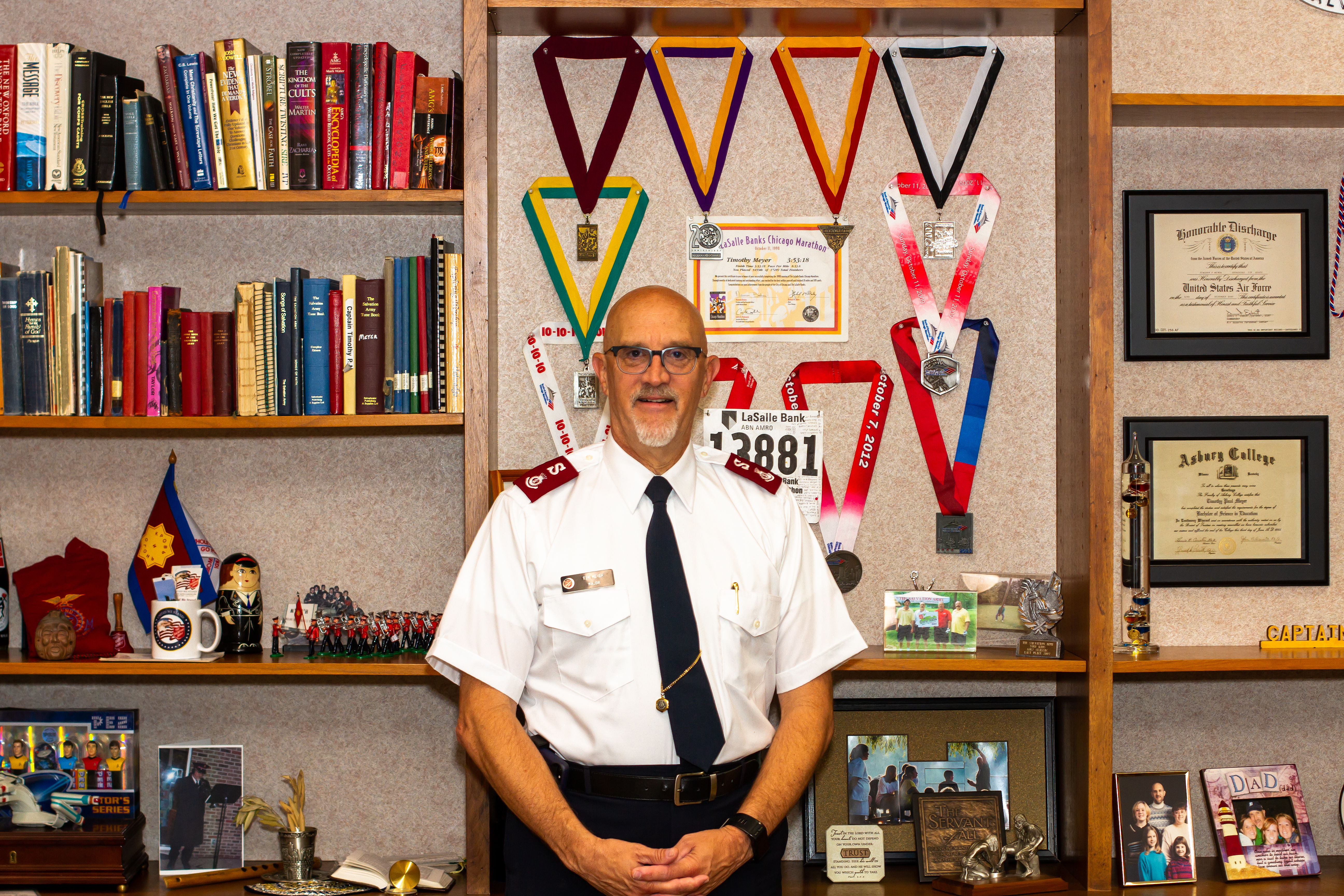Going The Extra Mile(s) For Survivors of Human Trafficking

In the spirit of Doing The Most Good for survivors of human trafficking, Major Tim Meyer, General Secretary and Metro Detroit Area Commander for The Salvation Army Eastern Michigan Division, is running the Detroit Free Press International Half-Marathon to raise funds for the most basic needs of human trafficking survivors. As they recover and begin to build new lives, their needs range from laundry money, laundry detergent, laundry baskets, kitchen items, hygiene items, and gas cards.
For more than 150 years, The Salvation Army has been advocating for the rights of women and children subjected to organized commercial sexual exploitation. In the 1800s, we pioneered an undercover investigation of sex trafficking, which helped shape the Criminal Law Amendment Act of 1885. By 1900, we had established over 100 "rescue homes" throughout London to abet safe escape from exploitation. More than a century later, we continue to fight for the abolition of sex trafficking worldwide.
The Salvation Army partners with local coalitions to raise public awareness of the injustices of human trafficking. By planning prevention activities and working to reduce the demand for commercial sex and forced labor, we prevent future victims. By providing support in all forms, we are a place for survivors to experience renewal and restoration.
Major Tim Meyer has run ten marathons and countless shorter races. He has served as an officer (pastor) in The Salvation Army for 28 years. Major Meyer will be participating in the Detroit Free Press International Half Marathon to fundraise for human trafficking survivors. A compassionate leader and avid runner, Major Meyer sat down for a Q&A to get the word out about the cause he is running for.
Q: How long have you been a runner?
A: My mom always used to say that the day I learned to walk, I learned to run. As a two year old, I would run everywhere. It got to the point where my mom needed to keep me safe but give me a way to let out my energy, so she got a harness like you would for a dog and hooked me up to the backyard clothesline so I could run as much as I wanted! But my first serious running was in junior high sprinting and hurdling. After high school, I was in the Air Force for four years, and I would run around our base to blow off steam. I only ran occasionally while in college.
After I became a Lieutenant in The Salvation Army, I started running again to maintain good health. I’ve been a disciplined runner since that time, barring any injuries or other complications.
Q: Speaking of which, how have you overcome injuries or health problems that affected your running?
A: I have experienced the disappointment and frustration of training for two full marathons and never making it to the starting line due to various injuries. It has not been easy to learn when to lay off and let my body recover when necessary. I also found safe ways to exercise around some injuries. For example, when I had a meniscus injury, I received permission from my doctor to do a 100-mile bike ride fundraiser. Whether it’s running or biking, whether it’s a 5k or a marathon, I’m always looking to be active and serve a cause when possible.
Q: What causes have you raced for in the past, and why now have you chosen anti-human trafficking as the cause this time?
A: I have run for The Salvation Army’s fundraisers, a children’s hospital, and World Services, but I think my choice to now run for anti-human trafficking is going to stick. Human trafficking is an insidious problem that must be addressed. One of my daughters has fought human trafficking for years through her work in The Salvation Army, and I have learned a lot from her about how trafficking ruins lives and hurts our world. Running provides a time for prayer and reflection for me, and there are three things that I always pray in regards to human trafficking: number one, I pray that the victims would be rescued and that they would never lose hope. Second, I pray that perpetrators would be brought to justice and that ultimately they would find forgiveness. Third, I pray that the demand would cease. If there weren’t a demand for it, it wouldn’t happen. The race that I’m participating in is such a neat opportunity because it’s organized among so many people for the same cause; it’s not just me alone out there.
Q: What has God taught you through running?
A: The overall lesson I’ve learned is to persevere. Have a goal, don’t give up on it, and pray about it. Pray about your biggest challenges in life. I have also learned not to judge, and there’s a story to go along with this: I was 36 years old and training for my very first marathon. I had gotten to the halfway point and felt like I was doing really well, then someone passed me up – and they were missing a foot. They had a steel blade for a foot; and I thought, here I am with two feet and falling behind. I was impressed. You never know someone’s story and what they’ve overcome to get out there to race. Have they lost 50 pounds in the last year? Have they seen combat? Have they just lost a loved one? Be gentle with people; be merciful.
Major Tim Meyer will be running the Detroit Free Press International Half-Marathon on October 20, 2019. Click here to donate and help raise funds for survivors of human trafficking.
